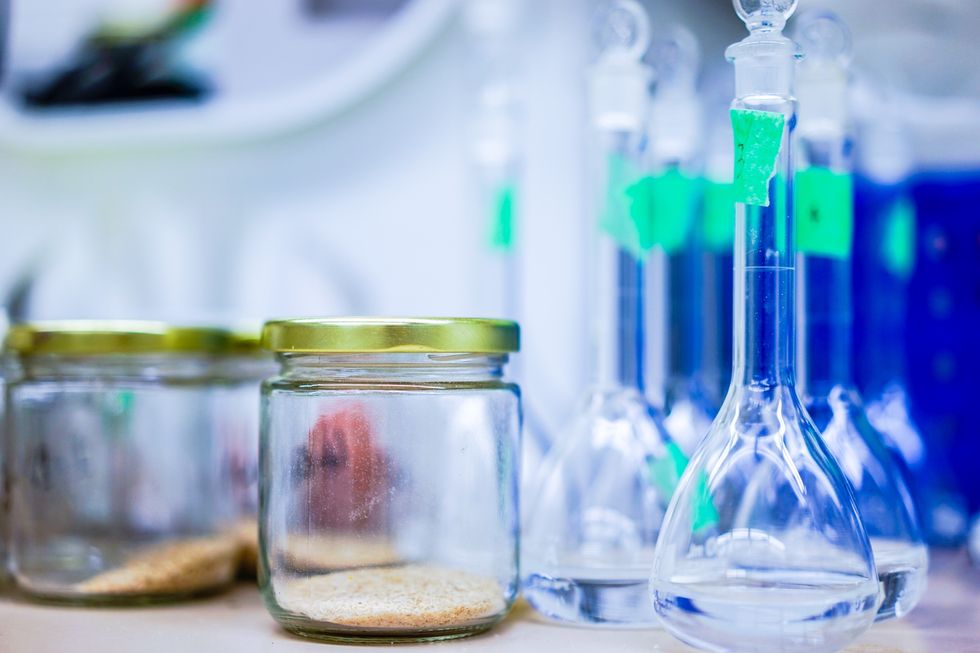You know the feeling of urgently needing to take a shower after a great ordeal? That was me after almost every four-hour chemistry lab class until I came up with my own ways to efficiently complete the lab reports, get higher yields, and even - heaven forbid - leave lab an hour early.
My credentials? I have consistently done well/ am doing well in the chemistry lab sequence (CHEM 203, 205, 237 in progress) at the University of Illinois, and I think it's because I never properly follow the lab manual (though this is not always a good thing, mind you.) The lab manual is not a cookbook, so don't treat it like one.
Here are a few of my best tips for riding the curves in the lab classes, rather than being dragged down by them:
WORKING EFFICIENTLY, GENERAL TIPS:
Your lab manual will talk about getting a certain amount of reagents first, before running your reactions. NO! Don't do that. While everyone is busy forming a line outside the weighing room, you go grab your hot plate, ring stands, vacuum hoses, filter flasks, etc- and complete your set-up. You will get the best pick of all the available equipment (no rusty extension clamps), AND you will find that by the time you have completed set-up, you have a clear path to the reagents.
While your reactions are running (i.e. reflux, rotavap, filtration) complete set-up for the next portion of your protocol and clean all your used beakers. Basically, you should never have a moment where you are just standing around.
Get an ice bucket to hold all of your used equipment, so you can haul everything to the sink at once and back, without making numerous trips.
When refluxing, go ahead and heat the plate to 325 degrees Celsius even if your solvent has a boiling point between 70 and 100 C. Wait until you get a nice boil going, then reduce your heat (I generally only reduce to 275 C, because I am an impatient person). Before experienced chemists get angry at me, ensure that the vapor is not escaping the top of the condenser, or you will lose solvent. "But the temperature of the solvent will remain at the boiling point throughout the reflux, so heating it higher won't make a difference!". Yes, it will. Your vapor will form, condense, and drip back down at a faster rate, and molecules will collide faster. Just make sure your desired products will not undergo a subsequent, undesired reaction with excess heating. *
*Attempt at your own risk. In my experience, heating the heck out of my reflux has cut the amount of time it would take me to run my reaction to completion in half.
EQUIPMENT TROUBLESHOOTING IDEAS:
Vacuum filtration: Leaky hose? Wrap a large-sized glove around the end of the hose attached to the filter flask, to create a better seal.
Any sort of distillation requiring water: Hose keeps popping out of the sink and spraying water everywhere? No problem, just invert a 400-mL beaker in the sink in your fume hood, keep it at a slant, and insert the hose at the bottom of the beaker.
Rotary evaporator: Spin at maximum speed to reduce bumping of solvent resulting in lower yield.
Column chromatography: Cotton ball stuck in the middle? Not an issue. Wet the cotton ball with solvent, get a vacuum hose, and blast air into the top of the column. My TA taught me this one.
Bonus: A good substitute for a ring clamp when you can't find one is a test tube rack. Stick your separatory funnel in here and it will stand up just fine.
INCREASING YIELD:
Start with 1.5x the number of reagents you normally would use, but make sure that the amounts you end up using are proportional to what they should have been.
When trying to crystallize a product, don't solely rely on that "grab a stirring rod and dip it in and take it back out to evaporate excess solvent" thing. Take the stirring rod, and stir vigorously, scratching the sides and the bottom.
ADDITIONAL THOUGHTS ON CHEM 203/205: ACCELERATED GEN CHEM LABS
Writing proper lab reports are of the utmost importance in these classes, and the impression you make on your very first lab report almost sets the tone for the remainder of the lab reports you write. You can lose a LOT OF POINTS on formatting your tables, figures, and sections incorrectly. So MAKE SURE! that for the first lab report, you (1) have a complete draft written two days after lab, so you can go to office hours and review whether or not you have the correct formatting, and (2) use Word Equation Editor and Chegg Citation Machine for your references.
SPEED IS NOT YOUR ALLY IN THE GEN CHEM LABS. Don't get too hasty and spill your product, you are graded on your percent yield.
WARNING!!!!!!: BEGINNING LAB REPORTS THE DAY BEFORE LAB MEANS YOU WILL BE (ALMOST GUARANTEED) PULLING AN ALL-NIGHTER.
These lab classes are very tough, but successful completion of them is possible and will be worth it when you reflect back on them. I promise.






















